How about a free hand embroidery pattern for today? This is a variation on a design – meant for cutwork or Battenburg lace – from an old Herrschner’s catalog. I have a collection of four of these old catalogs – one from the early 1920’s, one from the early 1940’s, a “supplement” from the 1940’s, and the better-known edition from 1907, which is also available online at Antique Pattern Library.
These catalogs are gems. Much like the Thomas Brown & Son catalog from the turn of last century which features embroidery patterns for ecclesiastical needlework, the catalogs have small line drawings that provide a wealth of inspiration from the past for embroidery in the present.
Take, for example, this design:
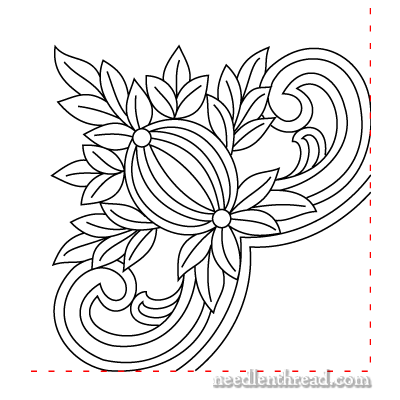
The original design in the Herrschner’s catalog is for a Battenburg lace doily. If you print four of the above corners and turn them, you end up with this:
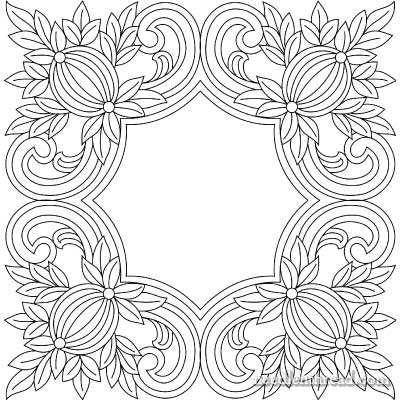
If you’re not into cutwork or Battenburg lace, you can reasonably look at this design as a suitable for all kinds of other embroidery applications.
When I look at this particular design, for example, I can see using the techniques explored in Estense Embroidery as a possible way of interpreting the design. It would also make a very pretty design, simply stitched in outline stitches, either in colors or in white, or in ecru on white or white on ecru. For texture, various filling stitches or patterns could be worked in the more open areas of the scrolls and so forth. Any other ideas on how the design could be interpreted in embroidery?
I like this design, and since I was in the market for an “inside” embroidery piece (one that I’d work inside on the sofa rather than outside in the workroom), I decided to transfer this design onto a piece of linen, to work it in one approach or another – haven’t decided which yet! A 14″ x 14″ piece of linen will give you about two inches around the outside edge of the design, all the way around. If you want a wider edge (more white space) around the design, cut your linen larger. And don’t forget to pre-shrink the linen before measuring and cutting, because it does make a difference in the finished size. This article on fabric for surface embroidery and tips on linen preparation has information at the end of it about pre-shrinking your linen.
Finally, here’s the PDF for the corner, which can be duplicated to make a whole doily:
Free Hand Embroidery Pattern: Pomegranate Corners (PDF)
Enjoy!
Looking for inspiration & information on hand embroidery?
There are all kinds of reasons to sign up for the Needle ‘n Thread daily newsletter! Check them out and sign up today!


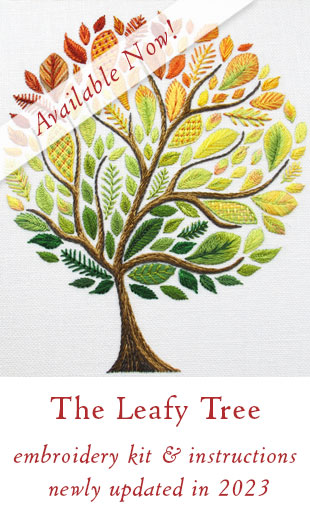
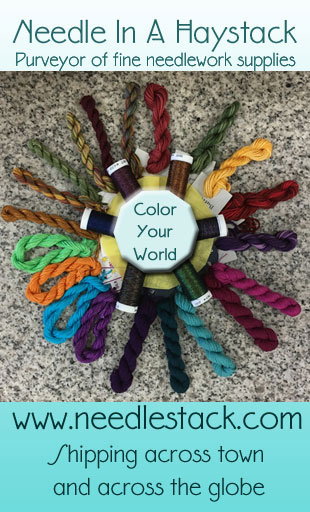
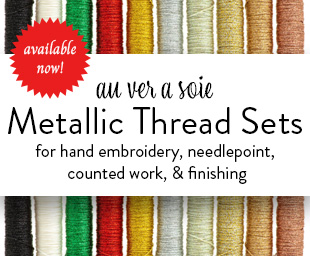


Nice design. I am curious how the original Battenburg technique was illustrated to accomplish the leaves……. In the catalogue did they have anything other than the line design?
Hi, Bobbi – it’s just the outlines on the leaves. And in fact, the piece could be a cutwork pattern. I am pretty sure it was listed under Battenburg, though. But I’ll have to dig it out to look at it again!
Hi Mary- I re-read your article on linen preparation. There are some opinions that linen embroidered with cotton threads (with the finished product something that will be laundered – such as a tablecloth)should not be pre-shrunk. The thought is that one would want the linen and cotton threads to shrink together. Perhaps cotton threads don’t shrink as much as linen? Perhaps it might depend on the density of the embroidery? What are your opinions of this?
JOEY!!!! YOU’RE BACK!!! Hi! Good to see you!
Yes, I think you’re right – the idea is that the threads and the linen will shrink together. I’ve found it’s not always the case. Even with very good linen, there’s a lot of shrinkage that goes on, and with cotton threads, they don’t always keep up. Take, for example, the 14″ x 14″ square I cut yesterday. It was 14″ x 14″ …. and then I did a hot-cold-hot-cold treatment, and ended up with about 13.5″ in one direction and about 13.75 in the other – so almost half an inch in one direction, and around a quarter (perhaps a hair more) in the other, of shrinkage. There’s just enough shrinkage capacity left in the linen, though, even after pre-shrinking, to make up for any thread shrinkage when using cotton. I’ve never regretted pre-shinking my linen, but I have regretted (several times) not pre-shrinking it! Not so much because of stitching or thread problems, either – more on account of the change in the finished size, especially when warp and waft don’t shrink evenly. Another reason I like to, at the very least, rinse the linen in warm or hot water before working anything is to get the sizing out. All linen, even very good linen (like Legacy) has at least a little bit of some kind of sizing in it, to make it easier to manage when they bolt it up. I like the idea of getting the sizing out. So that’s what I’ve found. I know Luzine doesn’t advise pre-shrinking with Schwalm work, and I’ve taken her word for that on the piece I’m (slowly – now and then) working on. Some day, I will finish it!
Thanks for the question, Joey, and welcome back!
Thank you, Mary! I found some absolutely gorgeous art nouveau flowers on the Antique Patterns site. I can’t tell you how glad I am you posted it.
Lovely!
And the rest of the comment …… I think Gilt Sylke Twist of lots of varying colours for the leaves, some purl couched for the curves, and then – an idea out of the blue – some fine wool for the pomengranates themselves
Thanks, Megan! Ahhhh – Gilt Sylke Twist. I haven’t used it in a long time. I think the design would require too much of it for my budget, though! 🙂
G’day there Mary, this is a ‘me’ design. Something kinda pulse quickening about it to me.
I love the pomegranates as are but I think would be suitable too to replace them with Waratahs when looking for an Aussie touch. Just the actual oval shape. The leaves beside it would have to be adjusted a little as the Waratah would spread out more, though mainly at the base.
This design is certainly a good exercise for stem stitch with sharp ‘corners’ and both tight and relaxed curves.
Beaut. Cheers, Kath.
Hi Mary
I just adore your site. Many thanks for being there to help us with your various tutorials. Going through your site makes my day. I have learnt a lot and will keep learning.
Hi, Pratima! Thanks for your kind note! I’m glad you enjoy Needle ‘n Thread! ~MC
mam please let me know more patterns of yours embroidery.Iam craze of making more & its my hobby too.It was very nice